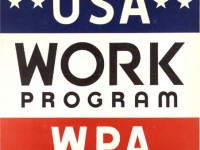S.C. Encyclopedia, part one of two| The New Deal was a collection of federal programs enacted between 1933 and 1939 to solve the problems created by the Great Depression. In South Carolina the New Deal brought three R’s: recovery for farmers, bankers, textile mill owners, and small businessmen; relief for the unemployed and destitute; and reform in labor-management relations, banking, sale of securities, and retirement. In the process the New Deal radically increased the role of the federal government in the state’s economy by creating permanent acreage allotment programs, agricultural credit, compulsory minimum wage / maximum hours requirements, protection for laborers who sought to unionize, Social Security benefits, a public welfare system, the Federal Deposit Insurance Corporation to protect depositors, the Federal Housing Administration to expand housing opportunities, and the Rural Electrification Administration to electrify the countryside.






 We Can Do Better, South Carolina!
We Can Do Better, South Carolina!

























Recent Comments